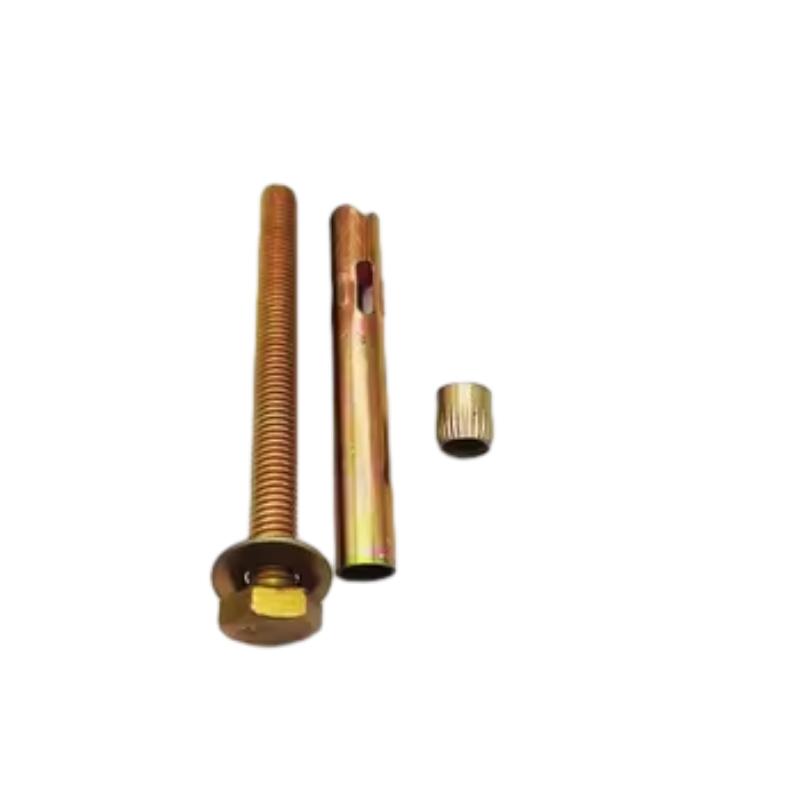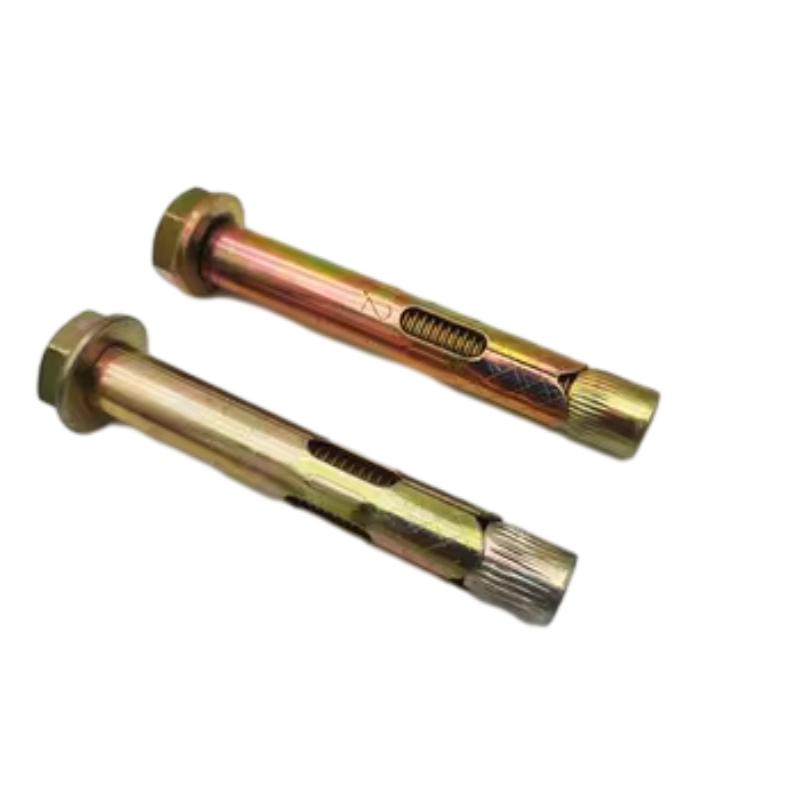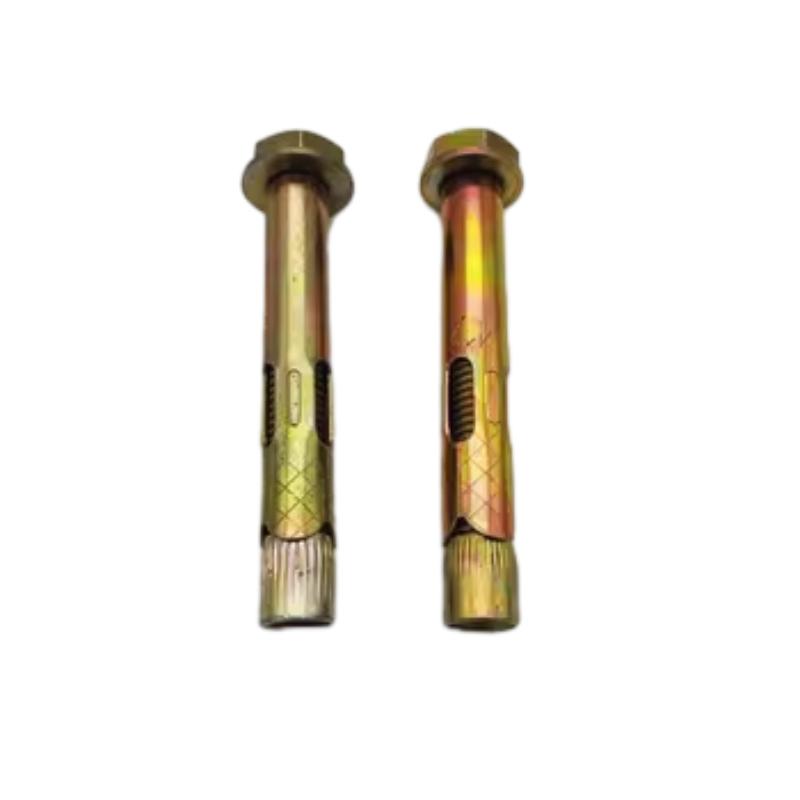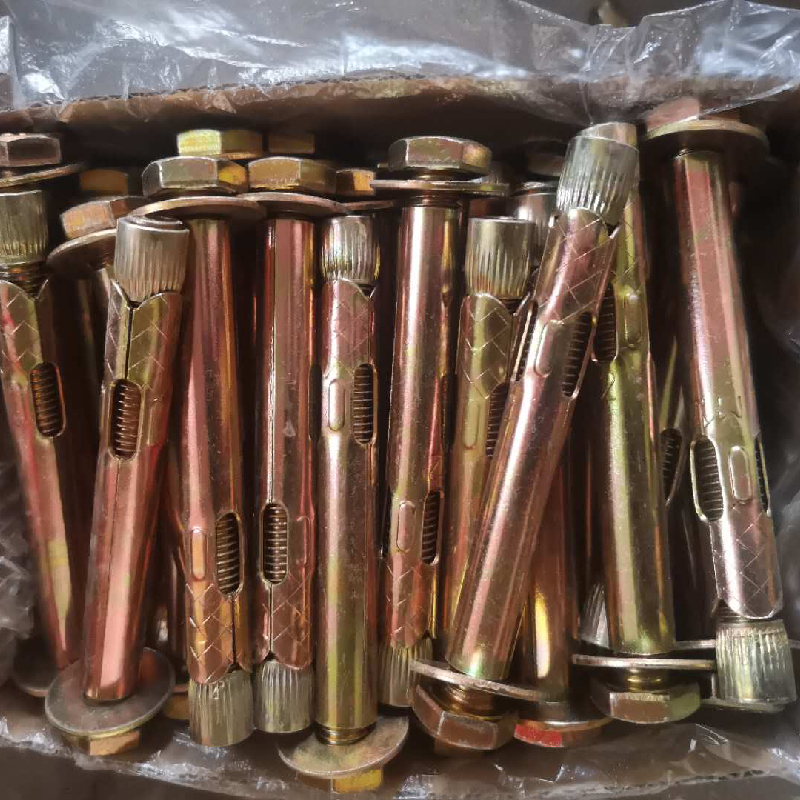Ago . 14, 2025 02:20 Back to list
Premium Hex Bolt Sleeve Anchors | Concrete & Masonry Fixings
Advancing Anchoring Solutions: An In-Depth Look at Hex Bolt Sleeve Anchors
In the demanding landscape of modern construction and industrial fastening, the reliability and performance of anchoring solutions are critically important. Among the diverse range of mechanical anchors, the hex bolt sleeve anchor stands out as a supremely versatile and robust choice for securely fastening fixtures into solid or hollow concrete, brick, or block. These anchors, often interchangeably referred to as hex bolt sleeve concrete anchor or hex head sleeve anchor, are meticulously engineered for high-strength applications, delivering superior holding power through an efficient expansion mechanism. The global fasteners market is experiencing significant expansion, with projections indicating a valuation exceeding USD 130 billion by 2027. This growth is substantially fueled by rapid advancements in global infrastructure development and the increasing sophistication of industrial manufacturing, underscoring the escalating demand for specialized, high-performance fastening components like sleeve anchors. These components offer consistent and predictable performance across a multitude of structural applications, proving indispensable for both heavy-duty and light-duty installations, ranging from the securement of heavy machinery bases to the precise mounting of structural steel frameworks.
The persistent pursuit of secure and highly durable fastening solutions drives continuous innovation within anchor technology. Contemporary hex bolt sleeve anchor designs now incorporate advanced materials and cutting-edge manufacturing techniques to significantly enhance resistance against pervasive challenges such as corrosion, vibration-induced loosening, and extreme temperature fluctuations. These continuous improvements not only extend the operational service life of critical installations but also markedly reduce ongoing maintenance requirements, resulting in substantial long-term cost savings for project stakeholders. Furthermore, the industry is increasingly gravitating towards more sustainable manufacturing practices, with a keen focus on sourcing and utilizing materials that offer an optimal balance of structural strength and environmental responsibility. For B2B decision-makers seeking to implement optimal fastening solutions that consistently meet stringent international industry standards and precise project specifications, a comprehensive understanding of the intricate design, manufacturing precision, and diverse application capabilities of these advanced anchors is absolutely paramount.

Technical Specifications: Unpacking the Hex Head Sleeve Anchor's Performance
The intrinsic effectiveness of any fastening system is rooted deeply in its precise technical specifications. A typical hex bolt sleeve anchor is composed of several critical constituent parts: a threaded stud, a uniquely designed expansion sleeve, a corresponding nut, and a washer. The operational principle is straightforward yet highly effective: as the hex head nut is progressively tightened, it exerts an axial pull on the tapered end of the threaded stud, drawing it into the pre-slotted expansion sleeve. This controlled inward movement forces the sleeve to expand radially outwards, generating a powerful, friction-based interlock against the internal walls of the pre-drilled host material. Key parameters, including the anchor's nominal diameter, overall length, and the specified embedment depth, directly and significantly influence the anchor's critical shear strength and tensile strength capacities. For instance, a widely recognized specification might be a dynabolt m12 x 60, which precisely indicates an M12 metric diameter combined with a 60mm length, making it ideally suited for a wide range of moderate to heavy-duty load applications. For structural engineers and project managers, comprehending these specific dimensions and their associated load-bearing capacities is absolutely fundamental to ensuring paramount structural integrity and comprehensive safety across all projects.
The selection of raw materials is equally critical to the anchor's performance envelope. High-quality carbon steel, frequently augmented with a durable yellow zinc plating for markedly enhanced corrosion resistance, constitutes the typical material choice. For applications in more aggressive environments, such as those characterized by persistent outdoor exposure, high humidity, or direct chemical contact—commonly encountered in petrochemical refineries or advanced wastewater treatment plants—stainless steel variants (specifically 304 or 316 grades) are the preferred and often mandated solution. Presented below is a comprehensive table detailing common specifications and their typical performance metrics, derived from rigorous, industry-standard testing for a representative sleeve anchor hex bolt. These performance values are the direct result of stringent testing protocols that strictly adhere to international standards, such as ASTM E488, which meticulously outlines the standard test methods for precisely determining the strength of anchors embedded in concrete and masonry elements. Adherence to such globally recognized standards unequivocally guarantees predictable and reliable performance across diverse and challenging operational conditions, directly answering the fundamental question of "what are sleeve anchors used for" in critically demanding scenarios.

The Manufacturing Process: Precision Engineering and Uncompromising Quality
The production of a truly high-quality hex bolt sleeve anchor is a sophisticated endeavor, involving a meticulously controlled series of advanced manufacturing processes. These processes are designed to consistently ensure uniform performance, exceptional durability, and uncompromised structural integrity. The journey typically commences with the rigorous selection of premium raw materials, predominantly high-grade carbon steel wire or specialized bar stock. These materials are chosen not only for their inherent strength characteristics but also for their optimal workability. Subsequently, this carefully selected material undergoes either cold heading or hot forging processes to accurately form the foundational shape of the anchor body and its integrated stud. Cold heading, a prevalent and highly effective method within the fastener industry, precisely shapes the steel without the application of heat, which remarkably preserves the material's grain structure and significantly enhances its ultimate strength. Following this, the stud is threaded using advanced roll threading techniques. These techniques are demonstrably superior to traditional cut threading as they meticulously preserve the material's continuous grain flow, thereby substantially increasing fatigue resistance and overall robustness. The critical expansion sleeve component is frequently manufactured through precision stamping or deep drawing processes, subsequently undergoing meticulous cutting and slotting operations to facilitate its controlled and reliable expansion mechanism upon installation.
Surface treatment represents another absolutely critical stage, particularly for products such as the "Fasteners Factory Wholesale Yellow Zinc Plated Hex Bolt Type Sleeve Anchor." Yellow zinc plating provides an outstanding degree of corrosion resistance by creating an impenetrable barrier against environmental moisture and various corrosive agents, thereby significantly extending the anchor's effective service life, especially in outdoor or semi-exposed conditions. This specialized process typically involves electroplating, wherein a uniform layer of zinc is electrolytically deposited onto the steel surface, which is then meticulously followed by the application of a yellow chromate conversion coating for enhanced protection and characteristic coloration. Throughout the entire manufacturing cycle, from initial material receipt to final product packaging, stringent and multi-layered quality control measures are rigorously implemented. This comprehensive quality regimen includes precise dimensional inspections utilizing advanced precision gauges, thorough material hardness testing, and ultimately, proof load testing to unequivocally verify both the tensile and shear strength capacities of the finished anchors. Unwavering adherence to globally recognized international standards, such as ISO 9001 for quality management systems and specific ANSI/ASME standards for fastener dimensions, ensures that every single sleeve anchor hex bolt consistently meets the most stringent levels of reliability and performance required for its diverse applications within critical sectors like civil engineering, complex mechanical assembly, and expansive energy infrastructure projects.
Applications & Technical Advantages: What Are Sleeve Anchors Used For?
The exceptional versatility inherent in the hex bolt sleeve concrete anchor renders it an indispensable fastening solution across an incredibly broad spectrum of diverse industries and demanding applications. Within heavy industrial environments, such as large-scale petrochemical plants and high-capacity power generation facilities, these robust anchors play an absolutely vital role in the securement of heavy machinery, critical pipe supports, and intricate electrical conduits to foundational concrete structures. Their inherently robust design enables them to reliably withstand significant static and dynamic loads, a characteristic that is absolutely crucial for maintaining operational safety and long-term structural stability. In the specialized metallurgy sector, these anchors are routinely employed for the precise mounting of structural elements and various pieces of equipment that are consistently subjected to elevated temperatures and frequently exposed to highly corrosive environmental conditions. In these challenging scenarios, the yellow zinc plating provides an essential and highly effective layer of protection against the onset of rust and material degradation.
For extensive municipal and critical infrastructure projects, particularly within intricate water supply and drainage systems, hex head sleeve anchors are extensively utilized to securely fasten pumps, sophisticated control panels, and a variety of piping components. In these applications, their superior resistance to both moisture and chemical exposure is a critically important attribute. Furthermore, in both expansive commercial and residential construction endeavors, they are widely adopted for the efficient installation of handrails, robust shelving units, aesthetically pleasing structural facades, and complex HVAC (Heating, Ventilation, and Air Conditioning) systems. The primary advantages associated with these anchors include their relative ease of installation when compared to more complex chemical anchors, which directly translates into reduced labor costs and accelerated project timelines. Moreover, their ability to establish a strong, consistently reliable grip in solid concrete, sturdy brick, and robust block materials is a key benefit. The inherent expansion mechanism ensures an incredibly secure fit, even in holes that may be slightly oversized, offering a valuable degree of tolerance that can significantly streamline on-site operations. This comprehensive array of benefits unequivocally answers the question of "what is a sleeve anchor used for" by demonstrably showcasing its wide-ranging utility and consistently reliable performance in the most critical fastening applications.

Choosing the Right Partner: Manufacturer Comparison and Custom Solutions
Selecting the ideal supplier for hex bolt sleeve anchors is a decision of equal importance to choosing the product itself. Truly reputable manufacturers distinguish themselves unequivocally through their unwavering commitment to consistent quality, strict adherence to internationally recognized standards, robust and proactive research and development capabilities, and the provision of exceptional, responsive customer support. When meticulously evaluating potential suppliers, B2B buyers must critically consider a multitude of factors, including but not limited to, relevant certifications (such as ISO 9001 and CE marking), predictable lead times, demonstrable batch consistency, and, critically, the proven ability to provide highly specialized custom solutions. For instance, while a standard dynabolt may indeed suffice for a broad range of general applications, highly specific or niche projects may necessitate custom lengths, the use of unique and high-performance materials (such as advanced high-grade stainless steel specifically designed for unforgiving marine environments), or the application of specialized coatings that extend beyond the capabilities of standard yellow zinc plating.
A thorough comparison of leading manufacturers often serves to highlight the paramount importance of significant production capacity combined with comprehensive quality control protocols. Factories equipped with advanced automation technologies and state-of-the-art in-house testing facilities possess a distinct advantage, as they can consistently ensure tighter manufacturing tolerances and deliver demonstrably higher product reliability. Our flagship product, the "Fasteners Factory Wholesale Yellow Zinc Plated Hex Bolt Type Sleeve Anchor," stands as a shining example of our unwavering commitment to these fundamental principles. We strategically leverage cutting-edge manufacturing processes and implement rigorous, multi-stage quality checks at every critical juncture of production, commencing from the initial inspection of raw materials right through to the final product testing and packaging. Our extensive and proven service history, which spans over two decades of dedicated operation within the highly specialized fastening industry, serves as a compelling testament to our steadfast dedication to consistently delivering high-performance solutions that not only meet but proactively anticipate the evolving demands and challenges of our esteemed clients. We offer truly comprehensive technical support, meticulously guiding our clients through the intricate processes of optimal product selection, outlining best installation practices, and fulfilling complex custom design requests, thereby guaranteeing optimal performance for their uniquely specific project requirements.

Ensuring Trustworthiness: Quality Assurance, Delivery, and Client Support
Cultivating and sustaining trust within the highly competitive B2B fasteners market transcends mere product specifications; it unequivocally demands robust quality assurance frameworks, transparent and predictable delivery processes, and consistently responsive, high-quality customer support. Every single batch of our "Fasteners Factory Wholesale Yellow Zinc Plated Hex Bolt Type Sleeve Anchor" undergoes exceptionally comprehensive and rigorous testing to meticulously ensure complete compliance with all relevant international standards, which notably include ISO, DIN, and ASTM. This rigorous testing regimen encompasses a wide array of critical evaluations, such as precise material composition analysis, accurate dimensional verification, thorough hardness testing, meticulous coating thickness measurement, and ultimately, ultimate tensile and shear strength validation. Our robust quality management system, proudly certified to ISO 9001, mandates strict and unwavering controls at every stage of the production pipeline, from the moment incoming raw materials are received to the final stages of product packaging. This uncompromising approach guarantees impeccable batch consistency and complete traceability, thereby effectively addressing any potential concerns regarding the long-term reliability and performance of a sleeve anchor hex bolt.
Regarding product delivery, we have meticulously established and maintain highly optimized global logistics channels to consistently ensure timely and exceptionally efficient shipment of our products worldwide. Our typical delivery cycle for standard volume orders ranges from a swift 15 to a maximum of 30 business days, with precise timing contingent upon the specific order volume and the geographical destination. For clients with urgent requirements, expedited shipping options are readily available to meet critical deadlines. We are committed to providing exceptionally clear and proactive communication throughout the entire shipping process, from the initial order confirmation and dispatch notification through to comprehensive real-time tracking updates. All our products are backed by a comprehensive warranty against any manufacturing defects, a testament to our profound confidence in their inherent quality and exceptional durability. Furthermore, our dedicated and highly responsive customer support team is always available to provide expert assistance with technical queries, offer detailed installation guidance, and address any after-sales service requirements, thereby ensuring a seamlessly positive and efficient experience for all our valued B2B partners. This unwavering commitment to both pre-sales and post-sales support significantly reinforces our established position as a highly trusted and premier supplier of high-performance anchoring solutions, effectively addressing fundamental questions like "what are sleeve anchors" and their practical, real-world applications.
Frequently Asked Questions (FAQs)
Q1: What is a sleeve anchor hex bolt and how does it function?
A: A sleeve anchor is a type of mechanical expansion anchor primarily composed of a threaded bolt, an expandable sleeve (typically slotted), a nut, and a washer. Its functionality relies on an ingenious expansion principle: when the hex nut is tightened, it pulls the bolt's tapered end into the sleeve. This action causes the sleeve to expand outwards and exert immense pressure against the internal walls of the pre-drilled hole in base materials like concrete, brick, or block, establishing an exceptionally secure and reliable hold.
Q2: What are the distinct advantages of utilizing a hex bolt sleeve anchor in comparison to other anchor types?
A: Key advantages include its remarkable ease of installation, broad suitability for various base materials (including both solid and hollow concrete, brick, and block), the ability for immediate load application (eliminating curing times associated with chemical anchors), and its proven high reliability in both critical tensile and shear load applications. The hexagonal head design facilitates straightforward tightening using standard wrenches, enhancing installation efficiency.
Q3: Which environmental conditions are Yellow Zinc Plated hex bolt sleeve concrete anchors ideally suited for?
A: Yellow zinc plating imparts a commendable level of corrosion resistance, making these anchors an excellent choice for indoor environments and moderate outdoor applications where exposure to severe moisture, high humidity, or aggressively corrosive chemicals is limited. For extremely harsh or persistently corrosive environments (e.g., marine atmospheres, highly acidic industrial settings), specialized stainless steel variants (304 or 316 grade) are unequivocally recommended for superior longevity and performance.
Q4: Is it permissible to use these anchors in hollow block constructions?
A: Yes, sleeve anchors are generally well-suited for effective use in both hollow block and hollow brick base materials. The expansion sleeve is engineered to expand across the internal void, establishing a secure grip. However, it is crucial to note that the ultimate load capacities in hollow base materials will typically be lower than in solid concrete. Therefore, it is absolutely essential to consult the manufacturer's specific load recommendations and guidelines tailored for hollow base material applications to ensure safety and performance.
Q5: What is the recommended installation protocol for a dynabolt or sleeve anchor?
A: The recommended installation procedure involves several key steps: First, precisely drill a hole of the manufacturer-specified diameter and depth using a rotary hammer drill. Second, meticulously clean the drilled hole to remove all debris. Third, carefully insert the anchor into the hole, tapping it flush with the surface if necessary. Finally, tighten the hex nut to the manufacturer's specified torque value using a torque wrench. Always ensure that the fixture intended for fastening is securely positioned prior to final tightening.
Authoritative References
- American Society for Testing and Materials (ASTM) E488/E488M, Standard Test Methods for Strength of Anchors in Concrete Elements.
- International Organization for Standardization (ISO) 9001: Quality management systems – Requirements.
- "Global Fasteners Market Report," Data analysis from reputable industry market research firms (e.g., Grand View Research, Market Research Future).
- "Design and Behavior of Mechanical Anchors in Concrete," Published in ACI Structural Journal.
- "Corrosion Protection of Fasteners: Fundamentals and Applications," NACE International Publication.
- "Concrete Anchors: Design, Performance, and Installation," Engineering Handbook Series.


